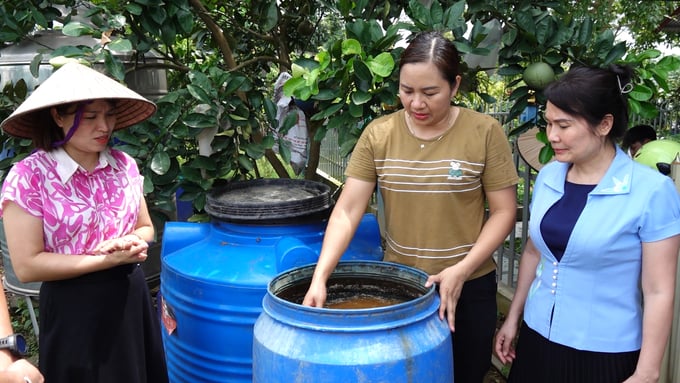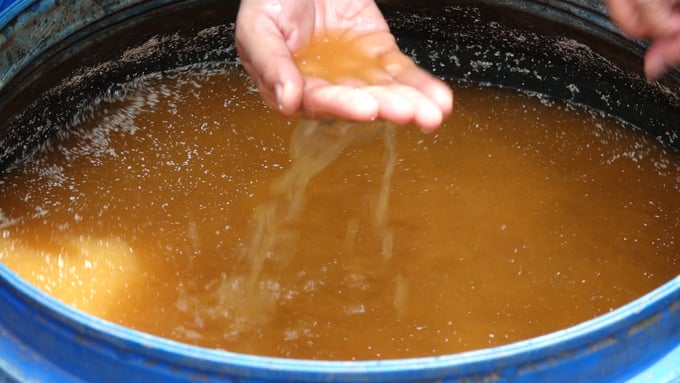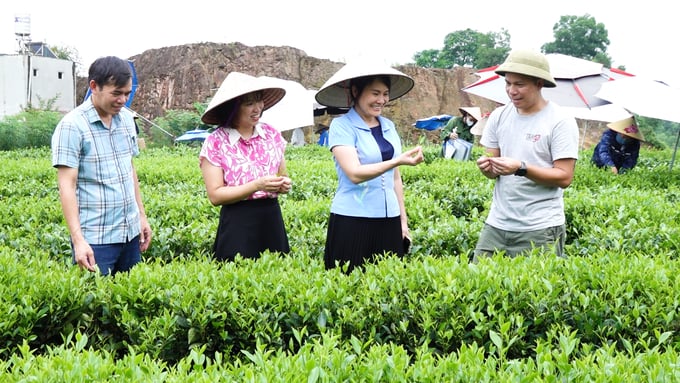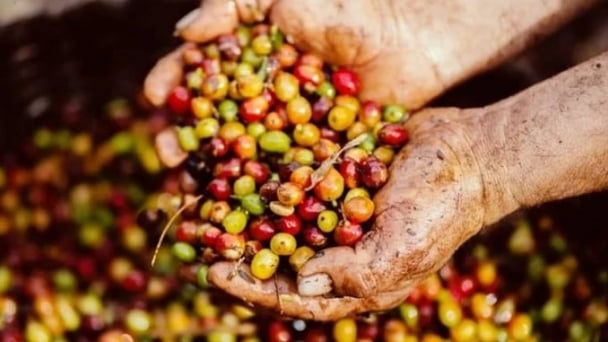June 17, 2025 | 17:48 GMT +7
June 17, 2025 | 17:48 GMT +7
Hotline: 0913.378.918
June 17, 2025 | 17:48 GMT +7
Hotline: 0913.378.918
With the aim of moving towards ecological and sustainable agricultural development goals in Thai Nguyen Province, Thai Nguyen City recently expanded several organic production models with the support of local businesses and residents, with tea production being a notable example.
Located four kilometers away from Nui Coc Lake, the tea farm belonging to Do Thi Dao, a resident of Phuc Xuan Ward, Thai Nguyen City, attracts the attention of numerous farmers eager to learn organic tea production methods. These methods include using homemade organic compost from various fruits, a practice that locals often refer to as "feeding fruit syrup to tea plants."

Do Thi Dao ferments organic compost in a 200-liter plastic drum.
"I acquire discarded fruits from local vendors, crush them, add water, and then ferment with probiotics in a plastic drum for two to three months. Each drum, with a capacity of 200 liters, is diluted with 2,000 liters of water for application to the tea plants through an automated irrigation system," Do Thi Dao explained.
The four-year-old tea farm, spanning over 2,000 square meters, has been fertilized with probiotic organic compost from the outset. Dao noted that her family has engaged in agriculture for several generations in Thai Nguyen province. Due to the tea plant's status as a key crop for the city and the province, she aims to develop the crop in a sustainable and organic direction to maximize their value.
Utilizing discarded fruit to create organic compost helps reduce waste and costs compared to traditional synthetic fertilizers. According to Dao, probiotic compost promotes strong root development in the tea plants, allowing them to absorb nutrients from the soil more effectively. Consequently, the soil becomes looser and more fertile, supporting increased earthworm activity.
With improved resistance and health, the tea plants have not required chemical pesticides over the past four years. Despite unusual weather patterns, the tea continues to grow steadily with a high yield.

After fermentation, the organic compost has a distinct pleasant, fruity aroma.
In addition to economic benefits and reduced labor, the use of organic fertilizers also protects the health of farmers involved in the production process.
"My family lives right next to the tea hill. If we used chemical pesticides, we would be the first to be affected, followed by harvesting farmers and then consumers. As a result, organic farming practices help protect the health of both my family and the community. I am willing to support and share experiences with anyone interested in pursuing organic tea production to build a safe, sustainable, and high-quality Thai Nguyen tea brand," Dao emphasized.
Nguyen Thi Lan, a young farmer involved in tea harvesting in Phuc Xuan Ward, Thai Nguyen City, expressed satisfaction with the environment surrounding the tea plants fertilized with organic compost.
"The clean air and the absence of harmful chemicals make the work significantly more comfortable. My intention is to remain in agriculture long-term, so protecting my health is crucial,” Lan commented.

The "fruit syrup" tea farm achieves high yields with the use of organic fertilizer.
According to Dao Thi Kim Quy, Director of Thai Nguyen City's Agricultural Service Center, the city currently focuses on developing tea production with high economic value in a sustainable, organic, and health-safe direction for both producers and consumers.
Over the years, the Agricultural Service Center has promoted various VietGAP and organic tea production models with the aim to enhance public awareness and create high-value products.
Thai Nguyen City currently houses approximately 1,500 hectares of tea production area, located primarily in the city’s northern wards such as Tan Cuong, Phuc Triu, Phuc Xuan, Thinh Duc, and Quyet Thang. To enhance the value of its tea products, the city has launched and implemented several projects, including the conservation and development of the Tan Cuong specialty tea region and the preservation of Trung Du tea varieties.
Moving forward, Thai Nguyen City plans to continue supporting the integration of production and marketing processes, thereby encouraging local farmers to engage in sustainable agricultural production.
From May 10 to 14, the Thai Nguyen Provincial Agricultural Extension Center provided supplies to cooperatives implementing a 40-hectare organic tea production model.
The total supplies included 250 tons of probiotic organic fertilizer, 500 liters of biological foliar fertilizer, and 150 liters of biological plant protection agents.
In addition to supplying materials, the Thai Nguyen Provincial Agricultural Extension Center is also collaborating with districts and cities to conduct training for farmers on organic production standards and to offer advice and guidance on the use of organic fertilizers and biological products.
Translated by Nguyen Hai Long
![Turning wind and rain into action: [5] Hue applies modern technology in disaster forecasting](https://t.ex-cdn.com/nongnghiepmoitruong.vn/608w/files/news/2025/06/17/z6704423696987_15fd32ffc26d590d204d520c9dac6786-nongnghiep-093938.jpg)
(VAN) In Hue city, modern technology has recently been applied in meteorological and hydrological forecasting and warning, helping to reduce the damage caused by natural disasters.

(VAN) A cutting-edge farming technique being implemented on an experimental ranch in Arizona's Sonoran Desert has already saved a billion gallons of water over five years, according to Civil Eats.

(VAN) Poultry and pig production and the environment can be boosted through enhanced water technology, according to new research.

(VAN) Coffee prices on June 16, 2025 are unchanged. In Vietnam, local trading prices are holding steady, ranging around VND 112,000 – VND 112,500/kg.
![Turning wind and rain into action: [4] Bringing climate bulletins to remote and isolated areas](https://t.ex-cdn.com/nongnghiepmoitruong.vn/608w/files/linhnhp/2025/06/14/1152-z6704423696987_15fd32ffc26d590d204d520c9dac6786-nongnghiep-151141.jpg)
(VAN) The Vietnam Agriculture and Nature Newspaper interviewed Mr. Vu Thai Truong, Acting Head of Climate Change and Environment at UNDP Vietnam, to gain deeper insight into how climate bulletins are delivered to farmers.

(VAN) In Tien Giang, a high-tech shrimp farm has developed a distinctive energy-saving farming model that has yielded promising results.
![Turning wind and rain into action: [3] 300.000 farmers benefit from agro-climatic bulletins](https://t.ex-cdn.com/nongnghiepmoitruong.vn/608w/files/news/2025/06/12/e5a48259d6a262fc3bb3-nongnghiep-125122.jpg)
(VAN) The agro-climatic bulletin has become a valuable tool for farmers in the Mekong Delta. After more than five years of implementation, the initiative is gradually being expanded nationwide.